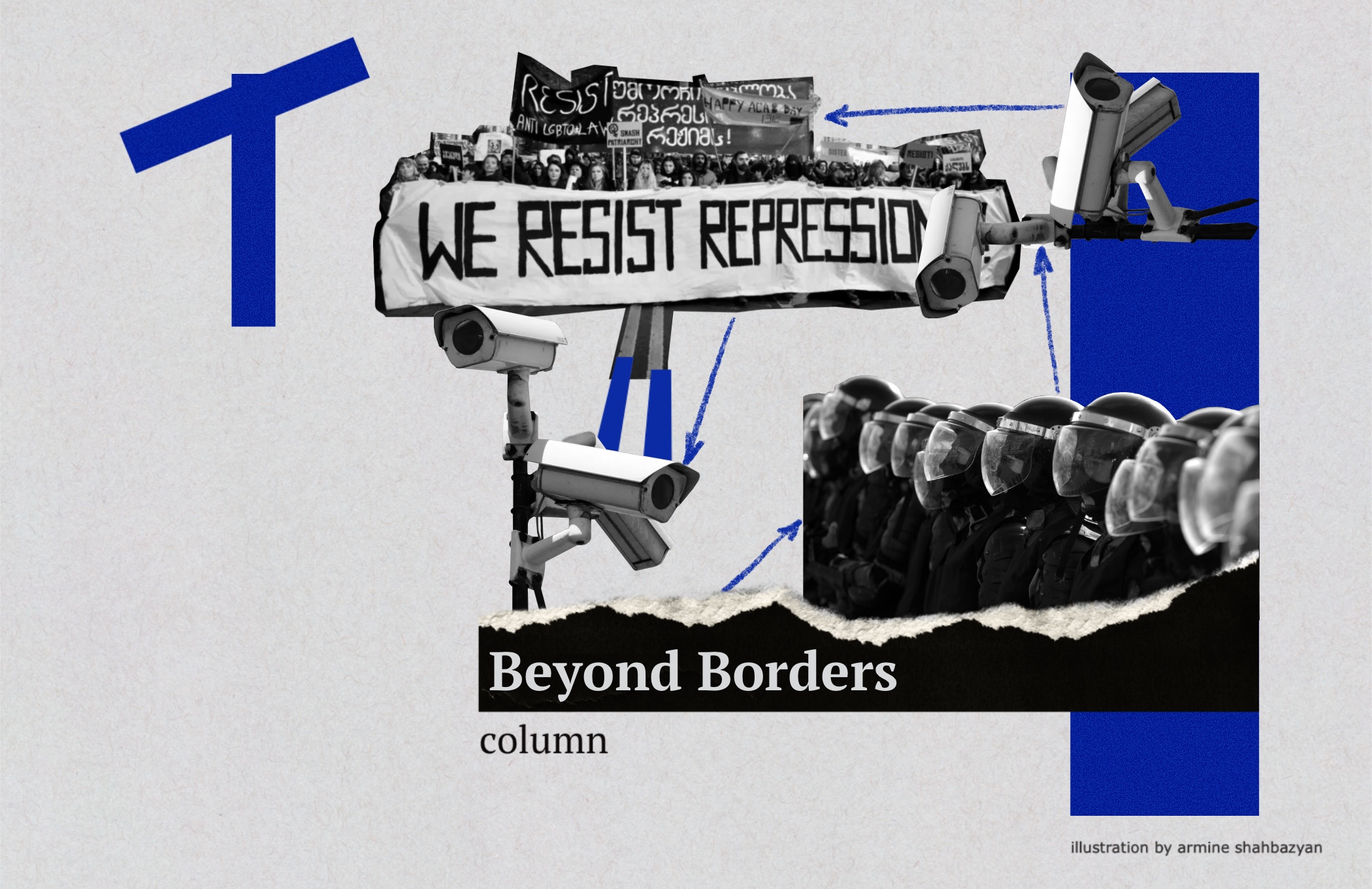[Beyond Borders]
This column explores the key issues shaping life in the South Caucasus, focusing on how the divergent paths of Georgia, Armenia and Azerbaijan reflect the region’s complex histories, economic developments, and political shifts. While new generations in these countries grow more isolated from one another due to language barriers and conflicting national trajectories, the same is true for local policymakers, who are often more familiar with distant capitals than their immediate neighbors. Each nation seeks its own path, sometimes in conflict with others, while international actors often treat the region as a whole, reluctant to craft policies specific to individual states. Drawing on personal experience with the region’s revolutions, conflicts and transformations, Olesya brings you Beyond Borders—a column exploring how decisions made in one corner of the South Caucasus impact all who live there.

Listen to the article.
For over 80 days, a familiar scene has played out in Tbilisi: every evening, hundreds of protesters gather outside the parliament building on Rustaveli Avenue. What began as a movement contesting the legitimacy of last October’s parliamentary elections swelled into a mass demonstration in late November, after Georgia’s ruling party abruptly suspended its dialogue with Brussels on EU integration. Since then, the protests have persisted, though both their nature and the government’s response have evolved.
The crowd has thinned, but those who remain are more resolute. Many protesters now arrive prepared for the cold, having learned survival tricks from weeks on the streets. Nearly every other person has already spent time in police detention or faces charges related to the demonstrations. Over the past month—especially in the last two weeks—authorities have ramped up financial penalties, issuing fines of nearly $1,800, a staggering sum in a country where the average monthly salary is four times lower.
The state’s approach has shifted. Where once riot police used force to disperse demonstrators, the government has now deployed the full weight of state institutions to suffocate the movement. Reports of masked assailants beating protesters have become common, while the ruling party has tightened penalties for defying authorities. The government has even installed Chinese-made surveillance cameras—the same models used in Moscow to suppress opposition rallies—across central Tbilisi, making it easier to identify and detain activists. Some, such as a well-known rapper and an opera singer, now find themselves in court, facing prosecution for their participation.
This campaign of suppression is set to intensify. The ruling party has announced plans to further tighten restrictions on foreign funding for NGOs, expanding on last year’s adoption of a Russia-style “foreign agents” law. Independent media has also come under fire. Since mid-January, Mzia Amaghlobeli, the founder of two popular online news outlets, has been in detention following a confrontation with police. She has been on a hunger strike for over a month. In mid-February, one of the country’s most prominent opposition TV channels, Mtavari Arkhi, went off the air, allegedly shuttered by a co-owner under pressure from the government.
A Government in Crisis
The crackdown’s effect on public sentiment is not easy to gauge. On one hand, fear has made public demonstrations riskier. On the other, these tactics only fuel the embers of defiance. A recent poll, dismissed as “orchestrated” by the ruling party, revealed that 60% of Georgians support the protests, and a similar proportion believe the country is heading in the wrong direction. Yet, many who share these sentiments may only return to the streets if it becomes safer to do so.
The protest movement could gain renewed momentum if the governmental leadership is forced into snap elections, a scenario that may become more plausible due to a possible parliamentary deadlock. Following the disputed fall elections, only the ruling party and its satellite factions took their seats in the legislature. Three of the four major opposition parties refused to recognize the results and renounced their mandates. The fourth, while also disputing the election outcome, has delayed formally vacating its seats, using them as leverage in possible negotiations with the ruling Georgian Dream party. Should they, too, withdraw, parliament may lack the quorum necessary for key functions, such as appointing judges or electing a new ombudsman, let alone amending the constitution or impeaching the president.
Meanwhile, economic pressures on the government are mounting. Since the protests began, currency volatility has plagued the Georgian lari, and financial experts predict further instability. Some banks reportedly have already frozen lending to real estate developers, an early warning sign of an economic downturn. The longer this uncertainty persists, the harder it will be for the government to maintain the economic incentives that help secure its support base.
The overall landscape is considerably more precarious for Georgian Dream than it was three months ago. Party founder Bidzina Ivanishvili has already been hit with U.S. sanctions and is hastily transferring his wealth—including an extensive art collection featuring works by Picasso—into Georgia, registering assets under family members’ names. The OSCE Office for Democratic Institutions and Human Rights has released a report citing many problems with the October elections, contributing to reinforced calls for new polls. In January, the Parliamentary Assembly of the Council of Europe (PACE) refused to seat Georgia’s delegation, granting the country until spring to address its democratic shortcomings.
Drifting Toward Isolation
Even if Georgian Dream concedes to early elections, they may not resolve the crisis. Unless electoral laws are reformed, a new vote could simply reproduce the old flaws, potentially worsening the situation. Under an increasingly restrictive legal framework, a snap election may entrench rather than alleviate political deadlock, pushing Georgia further into isolation.
And isolation is precisely where the government appears to be steering the country. With its ties to Western capitals fraying, Georgia’s diplomatic outreach is now largely confined to its immediate neighbors and select Middle Eastern states. Notably, Armenia remains one of the few regional allies still willing to engage with the scandal-ridden Georgian authorities. Yerevan has even backed Tbilisi in international forums such as PACE, highlighting Armenia’s precarious geopolitical position as a landlocked nation reliant on its northern neighbor for access to both Russia and the West.
Within Georgia’s political elite, a resignation to authoritarian drift is becoming increasingly evident. Relations with the EU and the U.S. show no signs of improvement, and in Brussels, discussions are growing louder about revoking Georgia’s visa-free travel privileges and free trade benefits. Some analysts suggest that Georgia is morphing into a “soft” version of Azerbaijan, an authoritarian state, but without the oil and gas revenues that insulate Baku from economic pressure. Worse still, this could deepen suspicions that Georgia is aiding Russia in circumventing international sanctions, potentially transforming the country into a hub for illicit financial activity, a gray zone of murky capital flows.
If this trajectory holds, the consequences will extend beyond Georgia. An entrenched political crisis in Tbilisi could ripple through the region, destabilizing neighboring states forced to contend with an internationally ostracized government. What began as a movement for electoral fairness and a pro-Western future has become a battle for Georgia’s fate—one with consequences for the entire South Caucasus.


